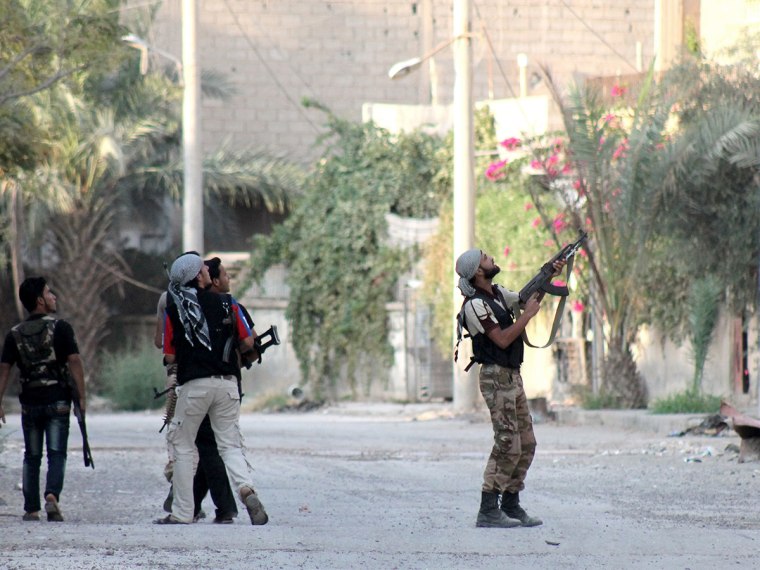The proposal for U.S. military action in Syria that a Senate committee is considering Wednesday appears to place some geographical and time limits on any strike the president could order, but it actually leaves open a loophole for ground forces and strengthens the president's claim that he can act without Congress.
If Congress approves the resolution, they would be more than just approving the use of force in Syria—they would be quietly acquiescing to what Republican Senator Rand Paul calls the Obama administration's "constitutional theater" by approving the president's ability to act without sanction.
"If we do not say that the Constitution applies, if we do not say explicitly that we will abide by this vote, you're making a joke of us. You're making us into theater," Paul said during a Senate committee hearing Tuesday to Secretary of State John Kerry. "And so we play constitutional theater for the president. If this is real, you will abide by the verdict of Congress."
Kerry dismissed Paul's criticism.
"I will leave to the man who was elected to be president of the United States the responsibility for telling you what his decision is, if and when that moment came," Kerry responded. "But the president intends to win this vote, and he's not going to make prior announcements."
President Obama announced Saturday that he would seek congressional authorization before striking Syrian dictator Bashar al-Assad, after accusing his regime of carrying out a chemical weapons attack near Damascus on Aug. 21 that killed almost 1500 people. The White House released a draft proposal that granted the president unlimited discretion over how to use military force in Syria. Congressional leaders said the proposal was too broad, and released an amended version Tuesday night, following the hearing.
The bipartisan resolution, drafted by Democratic Senator Robert Menendez of New Jersey, chairman of the foreign relations committee, and ranking member Republican Senator Robert Corker of Tennessee, does place some limits on the president's authority to act in Syria. The resolution states that force can only be used "against legitimate military targets in Syria," a geographical limit that did not exist in the administration's original draft proposal.
Nevertheless, the proposal explicitly endorses the administration's view that Obama can act without Congress, a view Kerry repeated to the Senate Tuesday. When Congress' 90 days are up, Obama would actually be on firmer legal ground with the authority to continue operations in Syria than he would have been without the resolution, because Congress endorses that view in the language of the resolution.
"The draft [authorization to use military force in Syria] does nothing to limit the president's claimed independent constitutional power to intervene in Syria regardless of what the Congress does," writes Jack Goldsmith, a former Bush Justice Department official who teaches at Harvard Law. Specific language in the resolution "actually supports the president’s claims for independent constitutional power in this context, in broad and unqualified terms."
The resolution does not prevent the administration from placing U.S. troops in Syria. It merely bars the administration from doing so for "combat operations," a significant loophole that Goldsmith writes would allow the use of ground forces for special operations or "search-and-rescue missions, and the like." U.S. servicemembers have also been sent to foreign countries in "advisory" roles that may ultimately include combat.
During Tuesday's hearing, Kerry stated that the administration would not place "boots on the ground" but seemed to leave open the possibility under certain circumstances.
"Let me very be clear now because I don't want anything coming out of this hearing that leaves any door open to any possibility. So let's shut that door now as tight as we can. There will not be American boots on the ground with respect to the civil war," Kerry said, while stating that "I don't want to take off the table an option that might or might not be available to a president of the United States to secure our country." The implication may be that the Obama administration doesn't intend to win the war for the Syrian opposition—which is not the same as a guarantee that American servicemembers would never set foot in Syria.
Even though Obama administration officials have stated the the aim of strikes would be to deter Assad from future use of chemical weapons and not regime change, the bipartisan proposal retains language allowing the Obama administration the option of destroying the Assad regime if it determines that doing so would be a "necessary and appropriate" way of preventing Assad from using chemical weapons again.
The Senate is set to mark-up the proposal Wednesday. While even the bipartisan resolution may be too broad for opponents of intervention, it remains too narrow for those like Arizona Republican Senator John McCain, who want the US to explicitly seek Assad's defeat. MSNBC reported Wednesday morning that McCain does not support the Senate resolution on Syria, because it "doesn't make any reference to changing the momentum on the ground."
Even if both Houses of Congress approve the measure, however, the administration still has an international law problem. UN Secretary-General Ban Ki-Moon suggested Tuesday that any U.S. action in Syria absent the approval of the UN security council would be illegal, and Syria's ally Russia is unlikely to back down from its threat to block any proposal to attack Assad.
"[E]ven if Congress authorizes Obama's strike on Syria, it will still be in violation of the United Nations Charter. The war will still be illegal under international law," writes Jack Balkin, professor at Yale Law School. "To invoke a metaphor from another war, he is destroying the village in order to save it."
